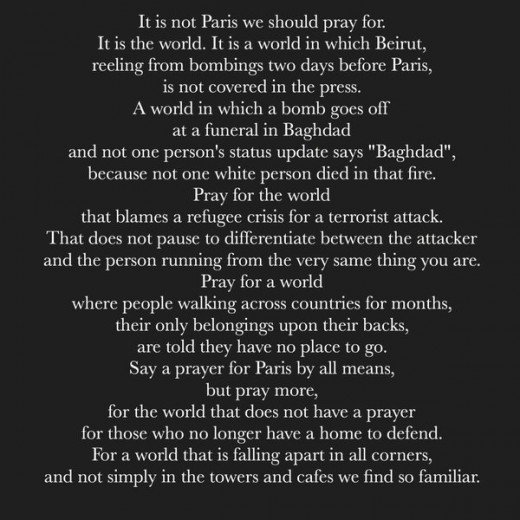The world reeled from shock over the weekend, when Paris became the latest target of a series of coordinated terrorist attacks that left at least 129 people dead and over 350 wounded, with 99 critically injured. Three teams of terrorists staged coordinated attacks at six locations throughout Paris on Friday night, including the Bataclan concert hall, the Stade de France stadium and at least two restaurants.
This has resulted in France closing its borders, clamping down on security, businesses in the city centre shutting their doors over the weekend, and the French government launching an airstrike against an Islamic State (IS) stronghold in Syria as retaliation for what its president, François Hollande, announced was an “act of war”.

Police, firefighters and rescue workers secure the area near the Bataclan concert hall on November 14 after the attack. (Photo from CNN)
Setting aside the fact that the scent of gunpowder is thick in the air, this series of unfortunate events will undoubtedly affect France’s economy, but few analysts expect a prolonged economic impact or change in its prevailing market directions, and that global markets will not see any knee-jerk reactions due to the fact that markets had the weekend to digest all the information. The possible fallout for financial markets when they open trading again will most likely be felt by these four following asset markets: oil, volatility, gold, and the Euro.
Well, enough with the background story. The question here is, will the recent Paris attacks affect Malaysia?
The short answer is no.
 Outside France, not many expect a market shock as significant as the one in 2001, when the World Trade Centre in New York was attacked and destroyed. It is only France’s tourism and luxury goods industry that will suffer for a while, as travellers opt for other destinations. The Paris attacks were seen causing a short-term sell-off in global stock markets and Asian shares fell on Monday, but few strategists expected a prolonged economic impact or change in prevailing market directions.
Outside France, not many expect a market shock as significant as the one in 2001, when the World Trade Centre in New York was attacked and destroyed. It is only France’s tourism and luxury goods industry that will suffer for a while, as travellers opt for other destinations. The Paris attacks were seen causing a short-term sell-off in global stock markets and Asian shares fell on Monday, but few strategists expected a prolonged economic impact or change in prevailing market directions.
Closer to home, Defence Minister Datuk Seri Hishamuddin Hussein said that he had received intelligence reports that several Malaysian leaders are now on the Islamic State (IS) target list, including himself. It is believed that the terrorist group wants to kidnap leaders whom they regard as tagut (those who have crossed religious boundaries), and have threatened action against police officers and army personnel whom they perceive as supportive of tagut leaders.
However, the threat of ISIS does not seem to loom large in many Malaysians’ minds, although there have been reports of Malaysians joining the terrorist group, and just yesterday, news that it was planning to form a Southeast Asian branch. Many are of the view that Malaysia, being a country with a predominantly Muslim population, will be safe from IS threats, or at least safer than many other Western or Asian countries.

U.S. President Barack Obama will be in Kuala Lumpur this weekend for the ASEAN Summit, along with other world leaders. Security is expected to be extra tight following the Paris attacks on Friday. (Photo by Chip Somodevilla/Getty Images)
Of course, with US President Barack Obama, Russian Prime Minister Dmitry Medvedev and a host of other world leaders due to arrive this weekend for the ASEAN Summit at Kuala Lumpur Convention Centre, it is only natural for the authorities to amp up their already tight security in wake of the attacks, not only in Paris, but also in Beirut, Lebanon; Bagdad, Iraq; and Syria, among many others. Our police force and military have to be extra vigilant in order to prevent anything unfortunate from happening, and to ensure that not only our foreign guests, but also normal everyday citizens, are kept safe from harm.
Remember the Thailand shrine bombing in August that killed more than 20 people? Although it was found to be the work of a disgruntled organisation in retaliation for deportation of its members, and not the IS, the idea is the same: for a country that relies heavily on tourism as a major (if not main) source of income, an attack like this will mean its economy taking a hit as well.
And Malaysia definitely cannot afford to have its already weak economy and precarious political situation exacerbated any further.
Meanwhile, I would highly recommend avoiding the Kuala Lumpur city centre area this coming weekend (unless you’re working or have to attend to business)… just in case.
Sources
Reuters (link)
CNBC (link)
The Star Online (link)
The Diplomat (link)
The Malaysian Insider (link)







